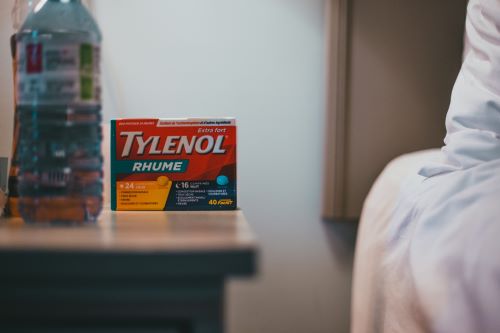
Are you wonder if UFC fighters take painkillers before a fight?
In this article, we’ll examine whether UFC fighters take painkillers before a fight and after a fight.
Contents
Do UFC (MMA) Fighters Take Painkillers Before a Fight?
There may be a very small percentage of UFC fighters taking painkillers before a fight on the odd chance they’re suffering from some minor pain or ache and it’s detracting from their focus on an upcoming fight.
They’d take legal NSAID painkillers such as Ibuprofen, Aspirin, Naproxen, or acetaminophen painkillers like paracetamol.
These are considered weak painkillers and generally don’t have too many side effects – but they do have side effects such as fatigue and drowsiness and UFC fighters should be careful about taking them too close to the time of a fight.
However, the overwhelming majority of UFC fighters don’t take painkillers before a fight to help specifically with pain experienced during a fight for three main reasons.
1. Painkillers have adverse effects
Taking painkillers before a fight may cause a UFC fighter to have slower reaction speed, drowsiness, dulling of senses, and poor coordination. Even the painkillers considered mild may subtly affect a fighter, so they’re best avoided.
Overall, painkillers have a negative effect on fight performance which outweighs any reduction in pain.
2. They’re not needed
UFC fighters don’t need painkillers before a fight because adrenaline is released into the bloodstream which causes the brain and body to focus on staying alive rather than on the pain.
Adrenaline also causes the release of endorphins and neurotransmitters which act as natural painkillers – thus making the taking of painkillers before a fight a waste of time.
After the fight is finished and fighters are no longer in a fight or flight state, the adrenaline starts to wear off and pain starts to show. It can take up to a couple of days for the full extent of the pain to show.
3. They can be dangerous/addictive
Stronger painkillers such as narcotics (opioids) which have a much more potent pain-killing effect are on the UFC/USADA prohibited list under the substances of abuse section.
Narcotics such as morphine, oxycodone, buprenorphine, and fentanyl were banned because they alter the brain and vital systems, most notably the respiratory system, and this creates a much higher level of unnecessary risk for UFC/MMA fighters during a fight.
Not only are painkillers dangerous during a fight, but they can be extremely addictive.
In his documentary, “The Smashing Machine”, former UFC fighter Mark Kerr shows viewers how he was addicted to painkillers such as Vicodin during his MMA career; which contains the opioid hydrocodone (still legal).
Because painkillers effectively mask pain, it can be easy for fighters to get addicted, even to legal painkillers considered weak such as Ibuprofen.
Therefore, the majority of UFC/MMA fighters avoid taking painkillers before a fight because they don’t want to fall into the habit of consistently taking them.
If UFC fighters want to take some of the prohibited narcotics before fights, they have to submit a therapeutic use exemption (TUE) to USADA via their physician for approval.
USADA often rejects most of these requests, or if they do approve one, they’ll limit the dosage to very small amounts.
Usually, the only time they’re accepted is when a UFC fighter’s had surgery and they’re going to be in serious pain (and not fighting for a while) without a TUE for strong painkillers like narcotics.
They reject many TUE requests because they want to protect the rights of clean athletes by making sure no athletes have an unfair advantage.
As painkillers can be dangerous if taken right before a UFC fight, while unknown, there’s likely a cut-off date for the painkiller roughly a week before an upcoming fight.
Having said this, there are still opioid painkillers UFC fighters can legally take. For example, hydrocodone and codeine are both allowed out of competition and are on the WADA 2023 monitoring program for in-competition use.
This means WADA is monitoring them for patterns of misuse but that they’re legally allowed to be taken by UFC fighters and athletes before a fight.
However, as mentioned above, they’re strong painkillers and no UFC fighter would ever take these just before a fight because of the danger and how they’d negatively impact their fight performance.
Do UFC (MMA) Fighters Take Painkillers After a Fight?
Yes, UFC fighters take painkillers after a fight as they’re part of the 6 ways they recover. After the adrenaline starts to wear off, UFC fighters will start to experience pain and take painkillers if necessary.
If UFC fighters have been badly hurt in a fight, they’re sent to the hospital where they’ll be given painkillers. It can take up to a couple of days for the full extent of pain to show, and UFC fighters will continue taking painkillers until the pain has subsided.
The Bottom Line
So, ‘do UFC fighters take painkillers before a fight?’
A small percentage of UFC fighters may take weak painkillers before a fight on the odd chance they have a distracting pain. They would only take painkillers which they know don’t give them any negative side effects that would affect their fight performance.
However, the overwhelming majority of UFC fighters don’t take painkillers before a fight because adrenaline masks pain. They also know the dangers and how painkillers could negatively impact their fight performance, even the mildest ones.




